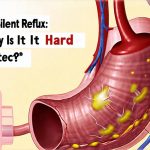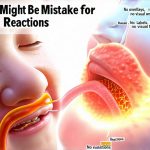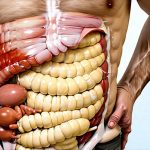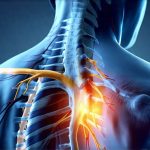Gastroesophageal reflux disease (GERD) is a surprisingly common condition affecting millions worldwide, often characterized by frequent heartburn and acid regurgitation. However, its manifestations can be far more diverse than these hallmark symptoms, leading to confusion and delayed diagnosis. Many individuals experience seemingly paradoxical issues like significant bloating even after consuming only small portions of food, which feels counterintuitive given the typical association between large meals and digestive discomfort. This disconnect often leads people to question their own bodies and seek answers for why something as simple as a modest meal can trigger such unpleasant effects.
The complexity arises from the intricate interplay between the esophagus, stomach, intestines, and nervous system. GERD isn’t just about acid; it’s about impaired motility – how effectively food moves through your digestive tract – altered visceral sensitivity (how your gut feels), and sometimes, even psychological factors like stress and anxiety that can exacerbate symptoms. Bloating after small portions in the context of GERD suggests a disruption in this delicate balance, often pointing to issues beyond simple acid reflux. This article will delve into the connection between these conditions, explore potential causes, and offer insights into managing this frustrating symptom. If you frequently feel tired after eating, it’s important to investigate potential underlying issues.
Understanding the Connection: GERD & Post-Meal Bloating
The link between GERD and bloating isn’t always immediately obvious because they aren’t necessarily directly caused by the same mechanism. Classic GERD symptoms stem from stomach acid flowing back up into the esophagus, irritating its lining. However, this reflux can contribute to bloating in several ways. Chronic inflammation due to ongoing acid exposure can disrupt normal digestive processes, slowing down gastric emptying and increasing fermentation in the gut – a process where bacteria break down undigested food, producing gas as a byproduct. Furthermore, many medications used to manage GERD, particularly proton pump inhibitors (PPIs), can alter the gut microbiome, potentially leading to increased bloating for some individuals.
Bloating itself is often caused by an excess of gas in the digestive system. This can result from several factors: swallowing air while eating, consuming foods that produce gas (like beans or broccoli), and – crucially – impaired digestion. When food isn’t broken down efficiently, it reaches the colon undigested, where bacteria feast on it, producing gases like hydrogen, carbon dioxide, and methane. In people with GERD, a sluggish digestive system is common, either due to the condition itself or as a side effect of medication, creating a perfect environment for bloating after even small meals. The sensation isn’t always about the amount of gas but rather how sensitive your gut is to its presence – a phenomenon known as visceral hypersensitivity which is frequently observed in individuals with GERD. Understanding are gas and bloating always food related can help pinpoint the cause.
This creates a vicious cycle: GERD can contribute to impaired digestion, leading to bloating; bloating can then exacerbate GERD symptoms by increasing abdominal pressure and potentially forcing more acid reflux. Identifying the specific drivers of bloating in your case – whether it’s related to medication, diet, or underlying digestive issues – is key to effective management. It’s important to note that bloating isn’t always a sign of something serious but persistent or severe bloating should be investigated by a healthcare professional to rule out other conditions. For some, reducing bloating after eating can significantly improve quality of life.
The Role of Gastric Emptying & Motility Issues
One of the primary reasons for bloating after small portions in GERD sufferers is often delayed gastric emptying – meaning food remains in the stomach for longer than it should. A healthy stomach empties its contents within 2-4 hours, allowing food to be processed and moved into the small intestine. However, when GERD causes inflammation or medication alters digestive function, this process can slow down considerably. This prolonged stay leads to increased fermentation, gas production, and a feeling of fullness even after limited intake. The stomach essentially becomes more like a fermentation chamber, amplifying bloating symptoms.
Furthermore, problems with intestinal motility – the coordinated contractions that move food along the digestive tract – play a significant role. GERD can disrupt these movements in several ways. Chronic inflammation can damage nerves responsible for regulating intestinal contractions. Some medications used to treat GERD, while effectively reducing acid production, can also have side effects that impact gut motility. This disruption leads to stagnant areas where bacteria thrive and gas accumulates. The result is a bloated, uncomfortable feeling even with minimal food consumption. The connection between some foods cause brain fog and bloating can be complex.
Identifying Potential Triggers
Pinpointing the specific triggers for post-meal bloating requires careful observation and potentially some dietary adjustments. Keeping a detailed food diary can be immensely helpful, noting not only what you eat but also how much, when you ate it, and – most importantly – how you felt afterward. Look for patterns:
- Are certain foods consistently associated with bloating? Common culprits include high-FODMAP foods (fermentable oligosaccharides, disaccharides, monosaccharides, and polyols), carbonated beverages, artificial sweeteners, and fatty foods.
- Does the timing of meals matter? Eating quickly or lying down immediately after eating can both contribute to bloating.
- Are there any non-food triggers? Stress, anxiety, and even certain medications can all play a role.
Consider an elimination diet under the guidance of a healthcare professional. This involves temporarily removing potential trigger foods from your diet and then reintroducing them one at a time to identify which ones are causing problems. Remember, this isn’t about permanent restriction but rather about understanding your individual sensitivities. It’s important to differentiate between food intolerances (like lactose intolerance) and allergies, as the management strategies differ significantly. Understanding the line between picky eating and digestive discomfort is crucial for proper diagnosis.
Dietary Strategies for Managing Bloating
Once you have identified potential triggers, dietary adjustments can make a significant difference. Focus on:
- Smaller, more frequent meals: This reduces the burden on your digestive system and prevents overfilling the stomach.
- Slow down while eating: Take your time, chew your food thoroughly, and avoid gulping air.
- Limit gas-producing foods: Reduce intake of beans, broccoli, cabbage, onions, carbonated drinks, and artificial sweeteners.
- Consider a low-FODMAP diet (temporarily): This can help identify sensitivities to specific carbohydrates. However, it’s best done with the guidance of a registered dietitian.
- Stay hydrated: Drinking plenty of water aids digestion and helps move food through your system.
Beyond these general guidelines, experiment with incorporating probiotic-rich foods like yogurt or kefir (if tolerated) to support gut health. Fiber is also important for digestive regularity but introduce it gradually to avoid worsening bloating initially. Mindful eating – paying attention to your body’s signals of fullness and hunger – can also help prevent overeating and reduce discomfort.
Lifestyle Adjustments & Seeking Professional Help
Lifestyle factors play a crucial role in managing both GERD and associated bloating. Regular exercise promotes healthy digestion, while stress management techniques like yoga or meditation can reduce visceral sensitivity and overall gut inflammation. Maintaining a healthy weight is also important, as excess weight puts pressure on the abdomen and increases the risk of reflux. Avoid tight-fitting clothing that constricts your stomach.
However, these strategies are often not enough to fully address the problem. If bloating persists despite dietary and lifestyle changes, it’s essential to consult with a healthcare professional – ideally a gastroenterologist. They can rule out other underlying conditions like SIBO, celiac disease, or intestinal motility disorders. They may recommend further testing, such as breath tests for SIBO or stool analysis to assess gut microbiome health.
Medication adjustments might also be necessary. If you’re taking PPIs, discuss with your doctor whether a lower dose or alternative medication could be more appropriate. In some cases, prokinetic agents – medications that help speed up gastric emptying – may be considered, but these are typically reserved for specific situations and require careful monitoring. Ultimately, managing GERD-related bloating is about a holistic approach that combines dietary changes, lifestyle adjustments, and, when necessary, medical intervention tailored to your individual needs. Navigating employment during and after treatment can be challenging while managing chronic conditions like GERD. And remember to prioritize self-care—coping with fatigue during treatment is essential for overall well-being.


















